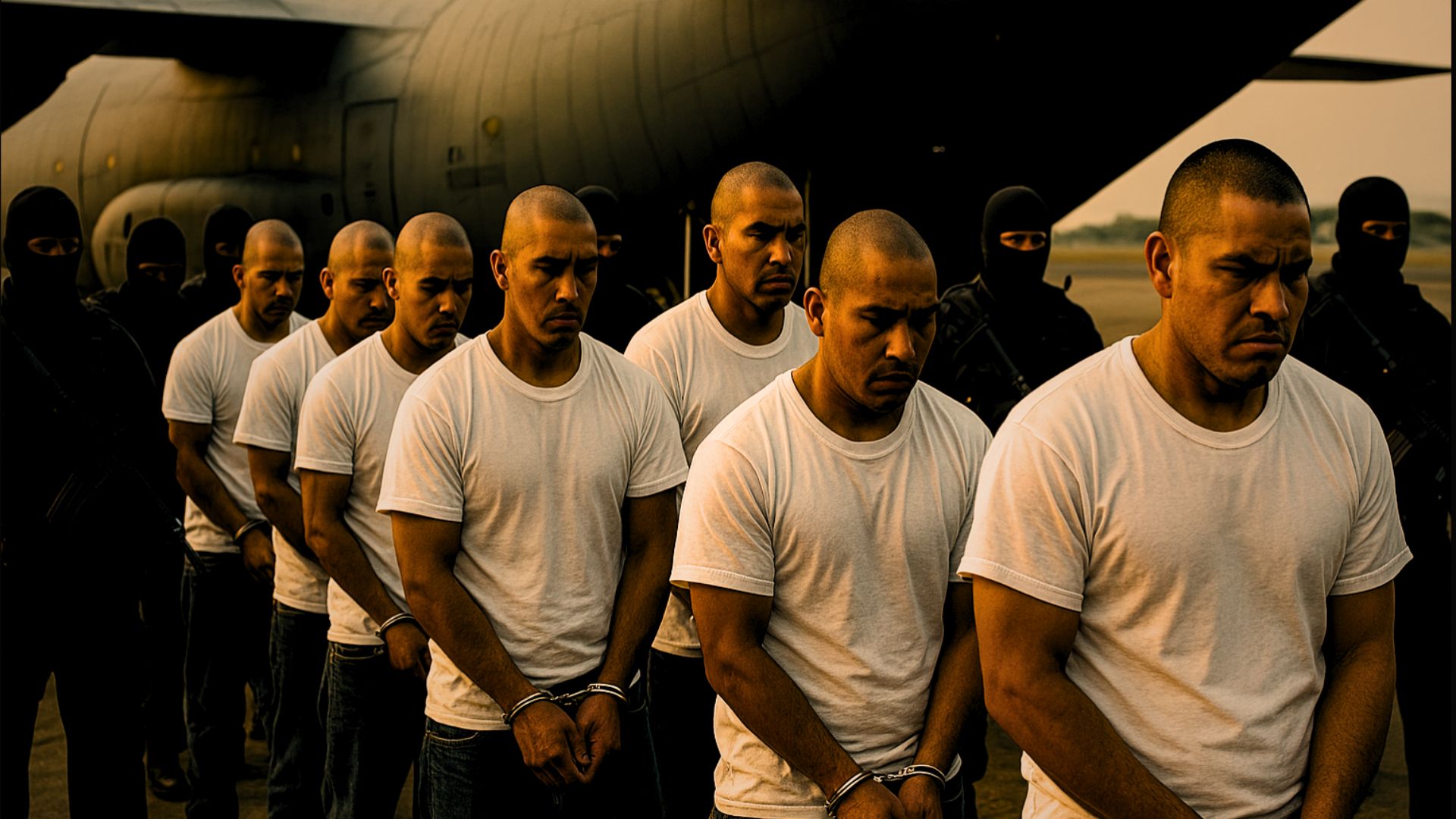By Dave “Davey D” Cook | Hard Knock Radio
(HKR-04-03-25) Over the past few months, deeply unsettling images have emerged showing men with shaved heads, shackled, and made to kneel—lined up in scenes disturbingly reminiscent of war prisons. These aren’t images from a foreign battlefield, but snapshots of what’s happening in El Salvador. Even more disturbing? Many of those detained were picked up in the U.S. and deported without due process, dumped into a prison system designed to disappear people.

To unpack the severity of this situation, Hard Knock Radio host Davey D sat down with long-time peacemaker and activist Alex Sanchez of Homies Unidos. Based in Los Angeles but rooted in the struggles of Central America, Sanchez has been raising alarms for decades about the dangerous intersection of immigration policy, criminal justice, and international politics.
How We Got Here: From Anti-Terrorism to Mass Deportations
Sanchez traced the roots of this crisis back to 1996, in the wake of the Oklahoma City bombing. The U.S. government responded with sweeping anti-terrorism laws that were supposed to target domestic extremists. Instead, the laws were weaponized against immigrants—particularly those with any criminal record, regardless of how minor or how long ago the offense occurred.
“Even green card holders—people who were legally in the country—became deportable,” Sanchez explained. Over time, this morphed into a broader narrative that equated immigrants with criminality, setting the stage for mass deportations of Latinos, Southeast Asians, Haitians, and others.
A Tale of Two Movements: The Disconnect Between Immigrant Rights and Criminal Justice
One of the most poignant parts of the conversation was Sanchez’s critique of how immigrant rights advocates and criminal justice reformers have often worked in silos. “The criminal justice movement said, ‘We don’t do immigration,’ and the immigration reform folks said, ‘We only want to help clean-cut immigrants,’” he said. That disconnect allowed punitive policies to thrive unchecked.
Davey D noted the bipartisan support for these measures, with administrations from Clinton to Obama continuing or expanding these deportation policies. “People were getting retroactively deported,” Davey D recalled, pointing to high-profile cases like Eddie Zen, a Cambodian American targeted for an offense committed as a teen.
Exporting American Gangs and Importing Fear
Sanchez made it clear: El Salvador’s gang crisis didn’t originate there—it was exported from the United States. After years of war and U.S. intervention, Central America was already destabilized. When youth with gang affiliations were deported from L.A. in the ’90s, they brought American gang culture with them—only to find vulnerable children ready to latch onto the image of power and protection they represented.

But now, that same dynamic has fueled the rise of a surveillance-police state under President Nayib Bukele. In 2022, Bukele declared a state of emergency after a breakdown in a secret pact with gang leaders. The response? Mass roundups. Over 85,000 arrests. A brand-new mega prison capable of holding 40,000 people. And the state-sponsored erasure of civil liberties.
The U.S. Role: Funding the Fear Factory
Sanchez and Davey D discussed the lucrative prison industrial complex growing in El Salvador—fueled in part by U.S. dollars. According to Sanchez, the Salvadoran government now receives $9 million per year per detainee to hold non-citizens—including Venezuelans whose home countries won’t accept them.
“Private prisons are now global,” Davey D warned. “The same corporations locking up our people here are running things down there.”
False Narratives and Media Gaslighting
Both men criticized mainstream media and social media algorithms for intentionally obscuring what’s happening. “We’re not seeing activists in our feeds anymore,” Davey D said. “Instead, we get influencers sipping coffee saying, ‘I’m not getting involved.’ That’s by design.”
Sanchez added that many deportees weren’t gang members at all. Some were arrested because of tattoos, anonymous tips, or personal vendettas. “Over 30% are innocent,” he said, citing human rights watchdogs.
The Bigger Picture: A Global Crackdown on Dissent
The conversation expanded beyond El Salvador to link U.S. foreign policy with authoritarian crackdowns worldwide—from the Philippines under Duterte to Modi’s India. “They’re perfecting repression abroad,” Davey D noted, “so they can bring it back here.”
Sanchez warned about growing efforts to criminalize nonprofits, protests, and even speech. “Look at how they’re going after pro-Palestinian activists,” he said. “They’re linking everything to terrorism. Today it’s immigration. Tomorrow it’s you.”
Final Thoughts: Humanity Is the Fight
Despite the grim reality, Sanchez remains committed to the struggle. “I’m not a monster,” he said. “I’m a father, a peacemaker, someone who’s trying to uplift our youth.” He called on listeners to support Homies Unidos’ youth leadership work and stand in solidarity with communities under attack.
“If we don’t speak up for each other, no one will,” he said. “What’s happening in El Salvador is a mirror. And if we’re not careful, we’ll be the next reflection.”
Support Homies Unidos
- Donate or learn more: https://www.homiesunidos.org
- Call: 213-383-7484
- Upcoming event: Central American Youth Leadership Conference, May 30, Los Angeles


Leave a Reply